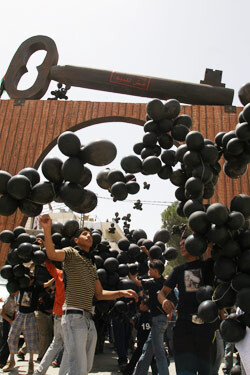The Electronic Intifada 20 May 2008

Palestinians release black balloons into the air at an event to commemorate the Nakba in the Aida refugee camp near Bethlehem, 15 May 2008. (Haytham Othman/MaanImages)
The president’s speech was absent of any real insight or policy. Instead of addressing the politics of a region that can only be likened to a powder keg about to explode, he bestowed on Israel a religious right, dangerous because it represents the views of the most rabidly extremist Jews, similar to the Jewish law student who assassinated Israeli Prime Minister Yitzhak Rabin and the gun-toting Israeli settlers (many holding dual US/Israeli citizenship) who populate Israel’s Jewish-only settlements across the West Bank, including East Jerusalem.
President Bush used the anachronistic words “Eretz Yisrael” (the biblical Land of Israel) to describe the Israeli state. This sort of usage was, and is, exactly what most right-wing Jewish fundamentalists use to refer to an Israel that reaches from the Euphrates River, in what’s left of today’s Iraq, to the Mediterranean Sea.
Adding insult to injury, he went on to praise Israel’s welcoming of immigrants from around the world to populate the newly created state of Israel. It meant absolutely nothing to Bush that the indigenous Palestinian population, lingering for 60 years only hours away from where he was standing while addressing the Knesset and on whose ruins Israel was built, remains today’s longest-standing refugee community.
The Palestinian refugees symbolize the protracted conflict between Israelis and Palestinians. The refugee problem has its roots with the declaration of the state of Israel on historic Palestine, which resulted in the mass displacement of over 750,000 Palestinian Arabs (approximately half of the Arab population). According to historical accounts of what occurred in 1947-48, including those by recent Israeli historians, Zionist forces precipitated the flight of the Palestinian Arabs as part of a campaign of population transfer. The nascent state of Israel subsequently enacted laws to expropriate the refugees’ property and bar their return. The refugees were left homeless and destitute, mostly dependent on foreign aid for survival. The subsequent Israeli occupation of the West Bank and Gaza Strip resulted in the further displacement of around 200,000 Palestinians.
Today there are over 5.5 million Palestinian refugees and displaced persons who have never been allowed the choice to return to their homes or given redress for their losses. The continued denial of their rights encapsulates the decades-long strife, disenfranchisement and dispossession the Palestinians have suffered.
With the advent of the peace process in the early 1990s, hopes were ignited that the Israeli occupation of the Palestinian West Bank and Gaza Strip would end and the plight of the refugees would be resolved. These hopes were dashed as the negotiations reached an eventual deadlock, leading to a stalemate and Israeli military onslaught on Palestinian areas that continues to plague the region.
Following the breakdown of the talks there was much debate about who was to blame for the failure. But this debate obscures the larger problem stoking the flames of conflict between Israelis and Palestinians: Israel’s unwillingness to comply with rules of international laws, including the rights of the Palestinian refugees, and third party failure to enforce them.
Taking the Palestinian refugee issue as a case in point, the state of Israel, which holds the key to solving their problem, has refused to recognize the right of the refugees to choose whether to return to their homes and has denied any responsibility for the problem since 1948. Israel has adopted this position in violation of international law, including UN General Assembly Resolution 194, which affirmed the right of the Palestinian refugees to return to their homes or receive compensation. The General Assembly has affirmed this most basic right of the Palestinian refugees every year since 1948. Additionally, admission of Israel to membership in the United Nations (General Assembly Resolution 273 of 11 May 1949) requires Israel to comply with General Assembly Resolution 194 of 11 December 1948. At the time, Israel stated it agreed to comply with this resolution.
Israel has defended its refusal to concede the right of return on the grounds that a massive return of Palestinian refugees would spell the death of the Jewish state. But admitting its historical responsibility to the Palestinian people and recognizing the rights of the refugees could in fact deliver security and prosperity to Israel. Indeed, Israeli recognition of these basic principles would improve the atmosphere on the ground, help create more parity between the parties, and provide a fair framework for working out the details of a peace plan for resolving the conflict.
Israel’s first prime minister said that “the old will die, and the young will forget.” A few days ago, Israel’s current prime minister, Ehud Olmert, explicitly stated that Palestinians must “relinquish your demand for the realization of the right of return.” Following these ill-fated desires, Israel has sought to deny or delay addressing the refugee issue. However, the amount of blood shed since 1948 proves the fallacy and the immorality of the Israeli position. Adhering to it will only lead to more bloodshed.
The rights of the Palestinian people, and in particular the refugees, should be recognized alongside any legitimate rights of the Israeli people. Ultimately, it is through the evenhanded application of international legitimacy that we may be able to get out of the current stalemate and reach real grounds for peace. Otherwise, the failed Israeli practice of “might is right” will prevail and prolong needless death and destruction on all sides.
It does not come as a surprise to Palestinians, and an ever-growing number of non-Palestinians, that Bush’s speech reflected blindness to the plight of Palestinian refugees. Those Palestinians in the Diaspora, not refugees, but Palestinians with their homes in the West Bank and Gaza Strip, along with non-Palestinian foreign nationals trying to assist Palestinians by working and serving in the occupied territory, have become the latest category of victims of the most recent application of the Israeli “might is right” mindset. Israel has been denying entry to scores of foreign nationals, Palestinians and others, trying to travel to the Israeli-controlled occupied territory. The mass majority of these foreign nationals are US citizens and the Bush Administration, although acknowledging that Israel is discriminating against US citizens based on their ethnicity, have done very little in standing up to its “eternal” ally Israel in order to resolve this latest problem.
If US citizens are left to vie for themselves in the face of Israeli intransigence, Palestinian refugees are absolutely correct in not believing that any US mediated “peace process” will lead to the realization of their inalienable rights, including the right of return.
The writer is a Palestinian-American businessman living in the besieged Palestinian City of al-Bireh in the West Bank. He co-edited with Staughton and Alice Lynd HOMELAND: Oral Histories of Palestine and Palestinians (1994) and can be reached at sbahour A T palnet D O T com.




